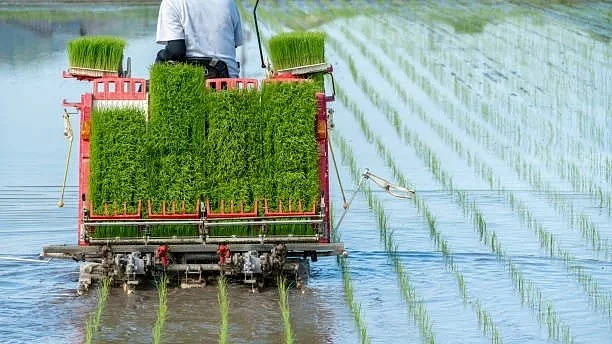Team Inspects Paddy Sowing With Latest Machine In MP's Jabalpur
A team saw functioning of latest step seed drill machine for sowing basmati paddy in a farm

Team Inspects Paddy Sowing With Latest Machine In MP's Jabalpur | FP Photo
Jabalpur (Madhya Pradesh): A team from Department of Farmer Welfare and Agriculture Development saw functioning of latest step seed drill machine for sowing basmati paddy in a farm in village Baroda.
Farmer Krishna Kumar Patel demonstrated the working of the machine to plant Pusa Basmati 1979, a paddy variety, on his six-acre farm.
According to deputy director Dr SK Nigam Patel has bought the step seed drill machine from Rajasthan this year for ₹ 1.25 lakh.This is an advanced machine with separate boxes for seeds and fertiliser.
A special feature of this machine is its ability to sow between 2 kg and 10 kg of seeds per acre.It also has a roller at the back that pushes the seeds into the soil after sowing.
The plants are spaced 18 inches apart, both from plant to plant and row to row, and tillering has already begun. Dr Nigam mentioned that in past, Patel has used the DSR (Direct Seeded Rice) method for production of this paddy variety and achieved a yield of 22 quintals per acre.
Assistant director of Agriculture Ravi Amravanshi informed farmers that using blue-green algae in paddy fields can reduce the need for additional urea without affecting paddy yield.
Given the current rainfall, a higher yield is expected this year.
Farmers shifting to Basmati rice cultivation
Farmers are rapidly shifting to Basmati rice cultivation, with the area under this aromatic grain surging from 10,000 to 40,000 hectares in the last five years.
This significant increase, despite rice being cultivated in approximately 1.75 lakh hectares during Kharif, is driven by Basmati's higher yields and lucrative market prices.
Assistant director of Agriculture said that varieties like Pusa Basmati are particularly popular.
Farmers are achieving 55-60 quintals per hectare, fetching Rs 5,000-5,500 per quintal for paddy, and up to ₹ 100-125 per kilogram for processed rice. With direct procurement by companies like 'Dawat' and favourable conditions, Basmati cultivation is boosting farmer incomes and positioning district as a key Basmati production hub.
RECENT STORIES
-
-
-
-
-